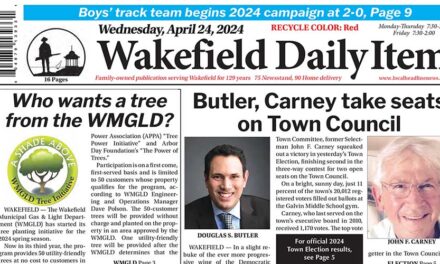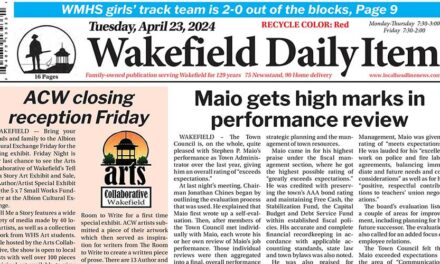Published in the May 3, 2017 edition
By MARK SARDELLA
WAKEFIELD — The School Department got its requested $38 million FY 2018 budget, including a 4.84 percent increase, but not before taking significant rebuke at Town Meeting Monday night for allegedly violating an agreement to limit its budget increase to 4 percent.
Two years ago, the Finance Committee and Town meeting agreed to an 11.4 percent increase for the School Department budget to make up for some lean budgeting years and to fund all-day, tuition-free kindergarten. That big bump in the school budget was couched in an understanding that the schools would limit budget increases to 4 percent for the subsequent three years.
Superintendent Dr. Kim Smith discussed the School Department’s budget request, touting the state’s high rating of the Wakefield schools. She said that the budget would allow for the third and final step of the school technology plan to be implemented. The budget would eliminate odd-numbered teaching teams at the Galvin Middle School, bolster the math faculty at the high school, and shore up the World Languages program. Smith also noted that the proposed budget incorporated the first step in eliminating user fees at the high school, cutting the fees by 20-25 percent.
Christine DeFelice of Lawrence Street pointed out that the School Department had made a promise to hold the line on budget increases to 4 percent. She said that she would like to cut the budget back to that 4 percent.
“The School Committee made a promise,” DeFelice said. “They have now reneged on it and I think everybody should hold them accountable. There has to be an end. They just want to spend, spend, spend.” She made a motion to amend the School Department budget by reducing the amount of the increase to 4 percent.
Bronwyn Della-Volpe of Cyrus Street supported the amendment to reduce the budget. She insisted that the School Department coming in with a budget request exceeding the agreed-to 4 percent was “unconscionable” and “a breach of trust.”
Marc Luca of Water Street said that he opposed the amendment to cut the budget and asked Smith what impact it would have if such a cut were to be made.
Smith said that it would not impact salaries, which are contractually negotiated, but would have to be cut elsewhere in the budget. She said that salary increases alone would have exceeded the 4 percent.
Andrew Bray of Highland Avenue also argued against the amendment. He noted that the budget process began in the fall and there were many opportunities to address budget concerns prior to Town Meeting. He called the school budget a “moral document” as well as a financial one.
Finance Committee member Daniel Sherman acknowledged that there was no formal, written agreement on the 4 percent, but rather it was based on trust between the Finance Committee and the School Committee. He maintained that the School Department knew as early as February that they were going to exceed the 4 percent limit and yet they never came to the FinCom to request a modification of the 4 percent agreement. Such a request, he suggested, would have been accommodated by the Finance Committee.
Instead, Sherman said, on the night before they were to present their budget to the FinCom, the School Committee voted to approve a 4.84 percent budget increase. While the FinCom ultimately voted 7-3 (with two abstentions) to approve the school budget, he said, “The Finance Committee was deeply disappointed. Trust and credibility in the School Committee is severely damaged.”
He pointed out that personal services spending in the School Department was up 5.1 percent as opposed to 2.7 percent for all other town departments. He suggested that the School Committee “didn’t do the math” when it agreed to the latest salary increases for its union employees in terms of the impact those increases would have on the 4 percent agreement.
Sherman said that he did not blame Smith. “She did her job,” he said.
“It’s not about the money,” he added. “We can afford it. The problem is the process. The process failed. There are consequences to what they’ve done. Credibility and trust have suffered.”
Sherman assured Town Meeting that next year, “The process will be adhered to. The School Committee will be asked to come to the Finance Committee in February, not April.”
Finance Committee member Joseph Bertrand of Shumway Circle said that he was one of those on the FinCom who had voted to approve the School Budget increase because “Dr. Smith was able to convince us of the need.”
Another Finance Committee member, Doug Butler of Main Street, said that he was one of those who abstained when the FinCom voted on the School Department budget because he was “furious with the breakdown of the 4 percent agreement.” But he opposed the amendment to decrease the budget, predicting that one of the first things to go would be the reduction in user fees.
School Committee member Greg Liakos defended the budget increase.
“We stand by the request,” he said, “because these are investments in the long-term financial and social health of the community.”
Fred Rich LaRiccia of Franklin Street also spoke in favor of the original budget, noting that majorities of both the School Committee and FinCom had voted to approve the budget increase.
Marc Luca then rose to offer an amendment to increase the School Department by $110,000 in order to accelerate the reduction in the user fees.
Town Moderator William Carroll explained that under Town Meeting rules, when amendments are made to budgets, the largest amount is put to a vote first.
The first vote was on Luca’s amended amount of $38,150,265. That motion failed.
The next vote was on the School Department’s original budget request of $38,040,265. That amount was approved by a large margin, but Christine DeFelice requested a hand count. The final vote was 323-22 in favor of the original budget.
—–
In other business Monday night, Town Meeting got through all of the $87 million FY 2018 Town budget, with most sections sparking little or no discussion.
Under Article 2, voters approved $2.1 million in capital outlay.
Under Article 3, Town Meeting approved $4,252,000 for the Debt Service Account.
Under Article 3 voters approved $877,975 as the “in lieu of taxes” payment from the Wakefield municipal gas & Light Department to the town.
Town Meeting also approved collective bargaining agreements for the town supervisory union and the police unions under Articles 5, 6 and 7.
Article 8 was indefinitely postponed, as the firefighters’ union and the town have not yet settled their contract.
Town Meeting will resume starting with Article 9 on Thursday, May 4, at 7 p.m. in the Galvin Middle School Auditorium.




